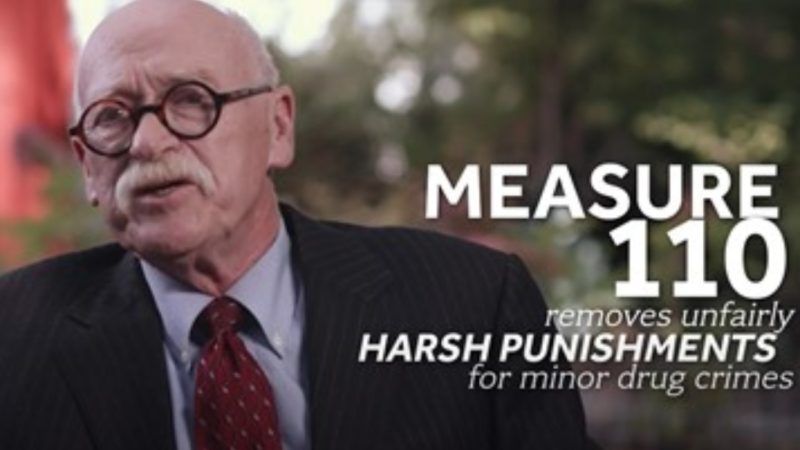Oregon's Drug Problems Were Not Caused by Decriminalization
Prohibition is at the root of the hazards that have led to record numbers of opioid-related deaths.

Three years ago, 58 percent of Oregon voters approved Measure 110, a groundbreaking ballot initiative that eliminated criminal penalties for low-level possession of illegal drugs. Last week, a group called the Coalition to Fix and Improve Ballot Measure 110 proposed two versions of an initiative aimed at reversing that reform, and recent polling suggests most Oregonians are open to the idea.
There are two main reasons for that reversal of public opinion, neither of which goes to the heart of the moral and practical case for decriminalization. Oregonians are understandably troubled by the nuisances associated with public drug use, and they are dismayed that, despite Measure 110's promise of more funding for treatment, opioid-related deaths have continued to increase.
The main idea behind Measure 110 was that consuming politically disfavored intoxicants should not be treated as a crime. Since drug use itself violates no one's rights, it is hard to argue with that premise.
Eliminating criminal penalties for drug possession, however, does not require tolerating conduct that offends, incommodes, or alarms people who have an equal right to use sidewalks, parks, and other taxpayer-funded facilities. That problem—which many major cities face, regardless of whether they routinely arrest people for drug possession—is distinct from drug use per se, just as disorderly alcohol-related conduct is distinct from drinking per se.
The alcohol comparison is instructive in another way. Even during Prohibition, which banned the production and distribution of "intoxicating liquors," drinking was not a crime. The situation created by Measure 110 is analogous, with all the dangers that criminalizing the drug supply entails.
Just as alcohol prohibition exposed drinkers to the potentially deadly hazards of bootleg booze, drug prohibition forces users to rely on black-market products of uncertain provenance and composition. Measure 110 did nothing to address that problem, which has led to record numbers of drug-related deaths across the country.
That trend was fostered by the proliferation of illicit fentanyl, a result of the economic incentives that prohibition creates, and by the government's crackdown on pain medication, which drove nonmedical users toward substitutes that are much more dangerous because their potency is highly variable and unpredictable. It is therefore not surprising that opioid-related deaths kept rising after decriminalization in Oregon, which saw increases similar to those recorded in California and Washington, neighboring states where low-level possession remains a crime.
Advocates of recriminalization argue that the threat of jail encourages drug users to enter treatment. But there are reasons to doubt that forcing "help" on people who do not want it is an effective way of resolving the social and psychological issues underlying life-disrupting drug habits.
According to a 2016 systematic review, "evidence does not, on the whole, suggest improved outcomes related to compulsory treatment approaches, with some studies suggesting potential harms." The authors conclude that "given the potential for human rights abuses within compulsory treatment settings, non-compulsory treatment modalities should be prioritized by policymakers seeking to reduce drug-related harms."
One danger of jailing noncompliant drug users is that incarceration raises the risk of a fatal overdose because forced abstinence reduces tolerance. According to a 2023 study, that risk is "markedly elevated" among people recently freed from prison, especially during the first two weeks after release.
Washington County District Attorney Kevin Barton, who supports the recriminalization of drug use in Oregon, says he favors "mandatory diversion just like we have for drunk driving." But drunk drivers have committed a crime that endangers other people, while Barton thinks drug users should be forced into treatment even when they have done nothing other than consume psychoactive substances that legislators have decided to ban.
Heavy drinkers are free to ruin their health and their lives as long as they do not injure or endanger others, and that was true even during Prohibition. But under the policy that Barton favors, all illegal drug users are equally subject to criminal penalties. Measure 110 rightly repudiated that morally indefensible distinction.
© Copyright 2023 by Creators Syndicate Inc.


Show Comments (31)